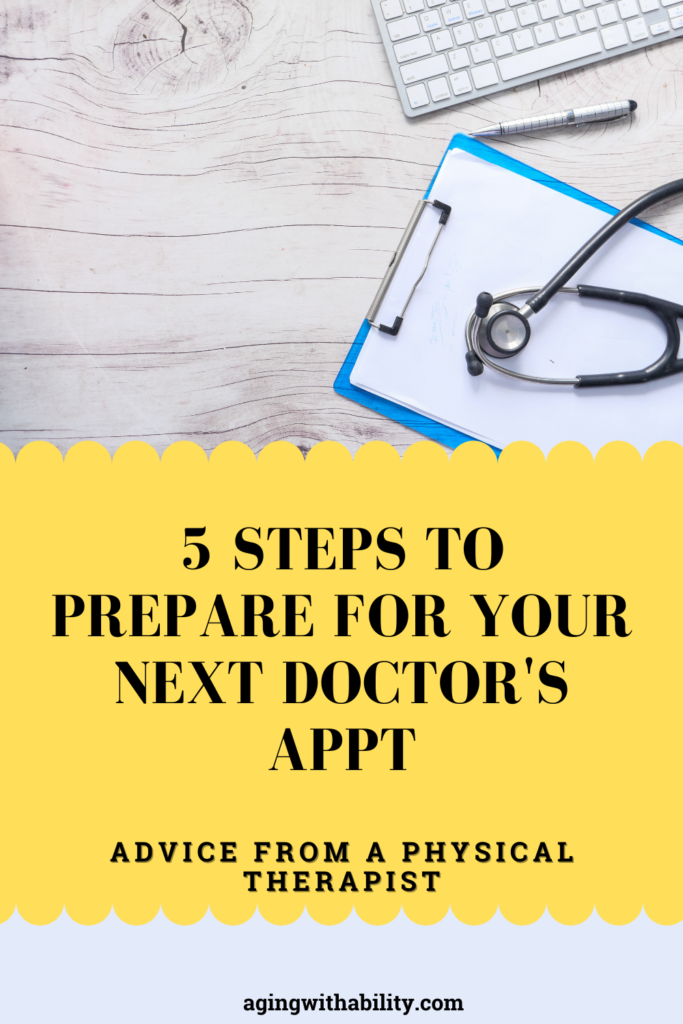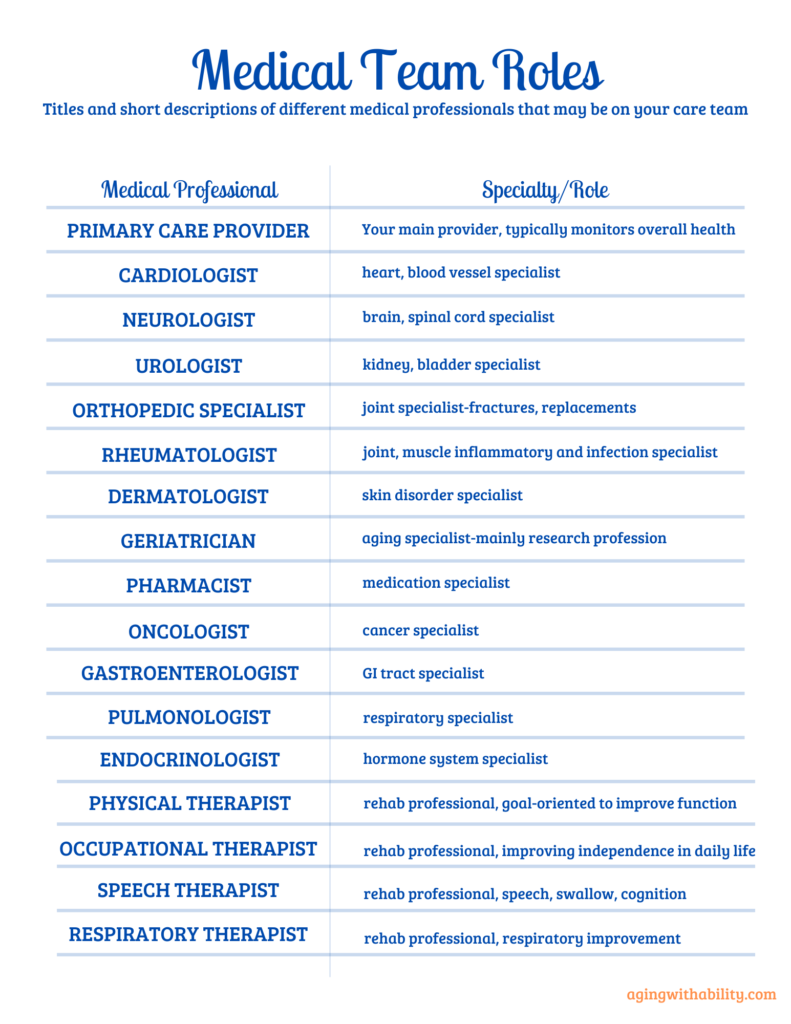
5 Steps to Help Make Your Next Medical Visit a Success
5 Steps to Help Make Your Next Medical Visit a Success
Have you ever felt rushed at a doctor's visit? Did you feel unprepared? I became a physical therapist partly because I wanted to be able to spend long periods of time with my patients, see them frequently, and work toward common goals. Unfortunately, the healthcare world continues to change due to pressures from lowering insurance reimbursements, larger patient to doctor ratios, and a population with increased chronic disease incidence. I want you to feel prepared for your next medical visit and be able to get the most out of that precious time. Here are some simple steps you can follow and even a printable checklist so you feel prepared.
Prepare a Condensed History
Preparing a history is an important part of ensuring a successful doctor's visit. Discussing your history can take up a lot of time, especially if this issue has been occurring for a long period of time and you are working with a new doctor. Preparing a brief history that includes when you started experiencing the symptom or concern, things that make your symptoms better or worse, what you have done about it so far, and your main concern to discuss with this provider can save a lot of time on an interview back and forth to answer these questions that can lead to side stories and poorly ordered information.
Providing a summary and your top concern for the day and allowing your provider to ask questions as needed to expand on the information provided or dig deeper into symptom intensity and the impact it is having on your life can help you use those short visit times wisely and get the main points across.

Do Your Research-But Don't Go Overboard
The internet can be a great resource for information but also can provide a little too much at times. Googling random symptoms without the context of your history and a physical exam or personalized discussion can provide some scary results. It can be useful to research your symptoms but use caution. Here are some quick tips:
Use Reputable Sources
Look at the source of the information and try to avoid reading many patient written posts. Reading information provided by healthcare professionals including research articles and information provided by organizations that create resources for specific diseases such as American Diabetes Association or Alzheimer's Association can be more accurate and broad and provide some guidelines. Reading individual stories about symptoms and treatments are not likely to be helpful and will lead to a lot of time wasted. To be clear this is different then being a part of a support group for a diagnosis you or a loved one has and asking if others have experienced a similar disease progression, event, or related condition. But still, these forums can be discouraging and add to anxiety as you await your medical appointment where information specific to you can be addressed and diagnostic testing and other appropriate interventions be recommended.
Look for Red Flags
It can be helpful to learn more online about what symptom changes would be appropriate for immediate care. Sometimes medical appointments can be weeks out from the time you call to report a change in health, asking your physician's office or using careful research and discernment can help you identify red flag symptoms that may need to be addressed more urgently even if that means seeking out an immediate care clinic or other resource.
Be Willing to Listen
After spending some time doing your research try not to go to your appointment with a diagnosis written in stone in your mind. You can definitely bring up what you read and are thinking about, but be willing to listen to your provider and their reasoning as well. If you still feel your concerns have been ignored or that the alternate diagnosis provided does not fit what you are experiencing feel free to seek out a second opinion. Doctors are human and not infallible and every doctor has a different clinical background and may not be as familiar with distinguishing similar diagnoses. Listen to your provider but if you feel brushed off, ignored, or do not have your questions answered adequately you can find another doctor and get a second opinion.
Write Down Your Questions
Along with preparing a history and doing some research, writing down any questions you have is a great tool as well. Having a physical, or digital, list can help you. You can also add notes to this sheet during the visit or as the next step suggests, bring someone along to do the writing for you.
Bring Someone With You
Depending on your family and friend situation and what you are being seen for it may be a good idea to bring someone along with you. You can discuss with them beforehand how actively you would like them to participate to allow you to advocate for yourself; however, having another set of eyes and ears can be beneficial when discussing important health issues. That other person could be there as your personal scribe as well if that feels appropriate. Taking notes for you and making sure your questions get answered.
Ask Questions
Asking questions is the best way to get the most out of your time with your provider. It allows them to know what is important information to you and helps contribute to clarity of communication and what is expected from you and the provider after the visit. You can ask many types of questions, here are some suggestions:
Ask About Alternative Treatments
Make sure you know what all the options are for treatment. Sometimes a physician may recommend a medication, but there may be similar patient outcomes if they instead choose to make dietary changes or increase exercise. Potentially a referral to a dietician or physical therapist is a more appropriate option for that patient in the long run and to decrease medication use and potential side effects. Sometimes a medication may be needed for short term management if blood tests are showing an out of range value but then that allows time for lifestyle changes guided by an alternative medicine provider, physical therapist, personal trainer, nutritionist, etc to take place and make an impact.
Ask About What to Expect With Recommended Treatment
Ask about when you can expect to experience an improvement with the recommended treatment. Also, ask about when the treatment should be stopped and another discussion take place-such as a medication reaction or other change in condition.
Ask About Follow Up
Make sure that you leave the office knowing the plan for your health. Did your doctor recommend a follow up visit within a specific time frame? Are you only going to need to contact them if it worsens or a side effect occurs? Understand when they want to hear back from you and what steps are needed next-such as diagnostic testing, referral time lines, etc.
Ask About Contact Information and Fees
Understanding your options for following up and getting the information you need is helpful. Asking about online contact and whether phone calls are answered quickly or voicemails returned quickly can help you understand how best to reach that provider.
Some doctors/offices are charging fees to answer emails or online communication requests through their patient portals. It may be worth asking whether this is occurring so you can make an informed decision about how to contact your provider in the future and whether a visit is more helpful than attempting to get an answer via email which may cost the same as your office copay.
Make the most of your next visit with these steps.
Let me know any feedback at christine@agingwithability.com
Check out this FREE medical role list to understand the different providers role in your care team

